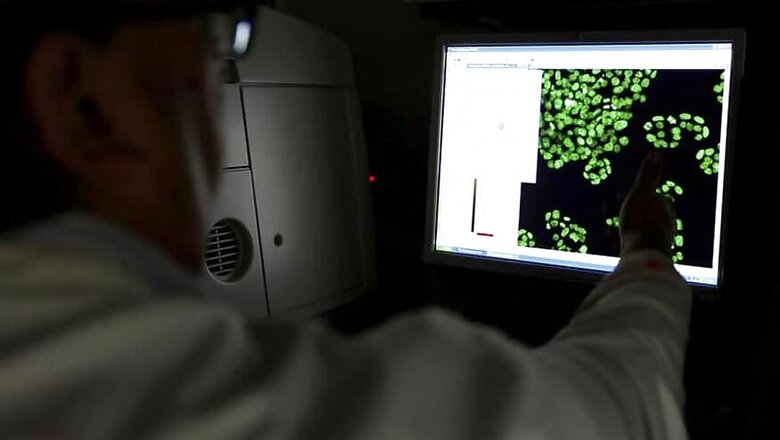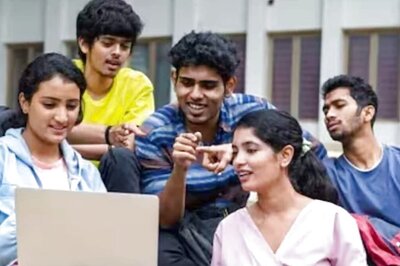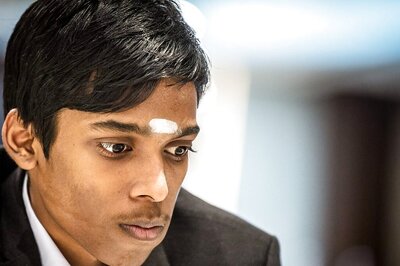
views
New Delhi: If you zap cancer when it's just a 1000 cells it's much easier to fight than when it's a trillion cells. If India is to bring down its cancer deaths from seven lakh a year, it needs to screen, detect, and treat people before symptoms start to show, said Dr Asutosh Tewari, professor at the ICAHN School of Medicine, Mount Sinai Hospital, New York.
Speaking alongside Dr. Madhav Dhodapkar, a cancer immunologist from Yale University, at the Hindustan Times Leadership Summit, Thursday, with WHO Deputy Director General, Dr. Soumya Swaminathan, the two cancer specialists stressed how important catching cancer early is.
India has 1.4 million cases of cancer a year, less than the United States’ 1.8 million. However, as Swaminathan pointed out, India's mortality outstrips that of the US due to a lack of management, early diagnosis and treatment.
A major intervention, the three scientists agreed, lay in changing lifestyles, which could prevent 30% of cancer deaths in India, according to Tewari.
“It’ll be hard for Indians to do so but we need to cut out sugar and salt from our diet,” said Swaminathan. “Cancer isn't caused by some past life but we can make changes in our current lifestyles to prevent it,” she joked at the end of the session.
India has an infrastructure problem. Only 15 to 20 percent cancer cases get caught early enough, and a majority of people don't have access to specialists or even a decent hospital, said Swaminathan. Tewari added that it costs three times to gain six more months in an ICU, after a painful and prolonged treatment, than it does to treat cancer early.
Most of the times, we think of disease as something from the outside attacking us, bacteria or a virus,” said Tewari, “in cancer, it's our own cells that attack us.” To fight cancer, he added, India needs different kinds of strategies, and parallel one for those who have resources and those who don't, he said.
The challenge in India is that most tumours are detected at an advanced stage, added Dhodapkar. His own work at Yale has focussed on immunotherapy, on how the immune system can be unleashed, through, antibodies, to fight cancer cells. Some of these therapies, said Dhodapkar, have shown “beautiful responses” against cancers such as melanoma. Another paradigm shift in cancer treatment, he said, was to inject immune cells in the patient’s body.
Medicine can now genetically modify immune cells to only attack cancer cells. Though these methods are still quite expensive, he said that India needed to invest in infrastructure if it wanted to bring newer forms of “one and done therapies” -- where, unlike traditional chemotherapy, either one or a low amount of dosage is enough for a patient.
Technology certainly has progressed by leaps and bounds, but it can only take people so far. Though, artificial intelligence and robotics are integral to sequencing genomes and for aiding surgeries they won't make an average surgeon better, said Tewari. What robotics can do during surgery is to help a suregon see difficult to reach organs beter, handle them more delicately and minimise loss of blood.
Urban lifestyles have lead to a uptick in certain kinds of cancer, such as breast cancer in women, and addictions such as tobacco are known to cause oral and lung cancers. Simultaneously, there is a confusing glut of information on which diet or food may cause or prevent cancer. Certain foods may cause inflammation, which may lead to cancer in that organ, said Tewari. However all three scientists were clear that there is no precise data on whether certain diets give you a better chance to prevent cancer or not.
The best prevention for such a multifactorial disease, is to lead a healthy lifestyle, said Swaminathan. There is no evidence that certain foods or yoga will prevent cancer, but they are part of healthy living.



















Comments
0 comment